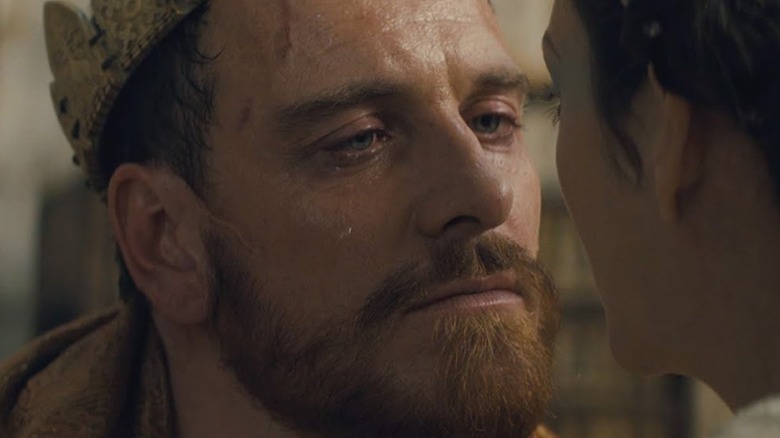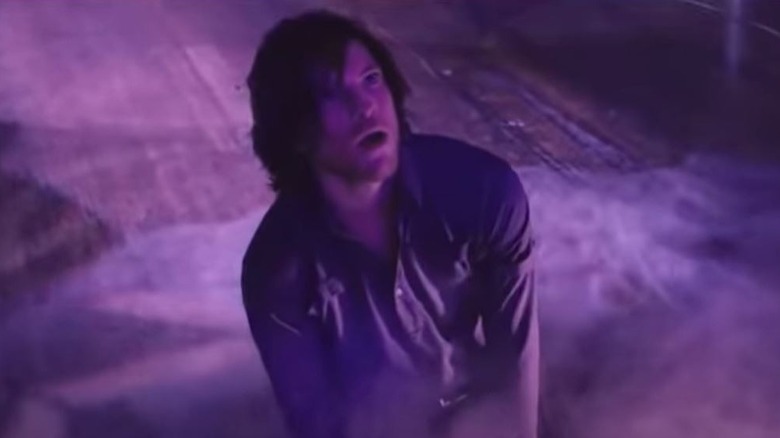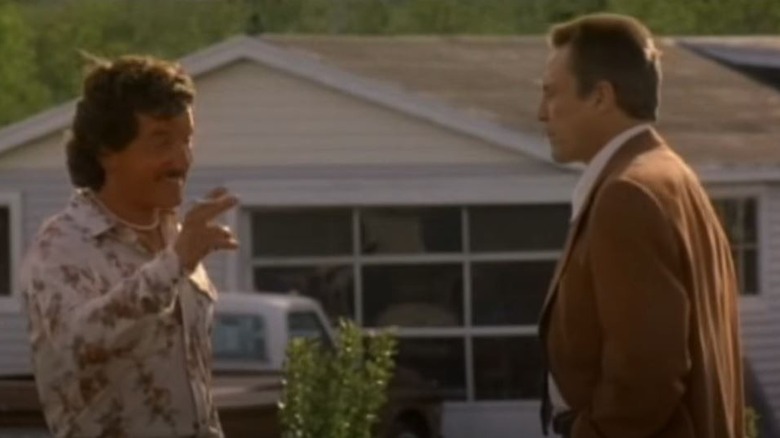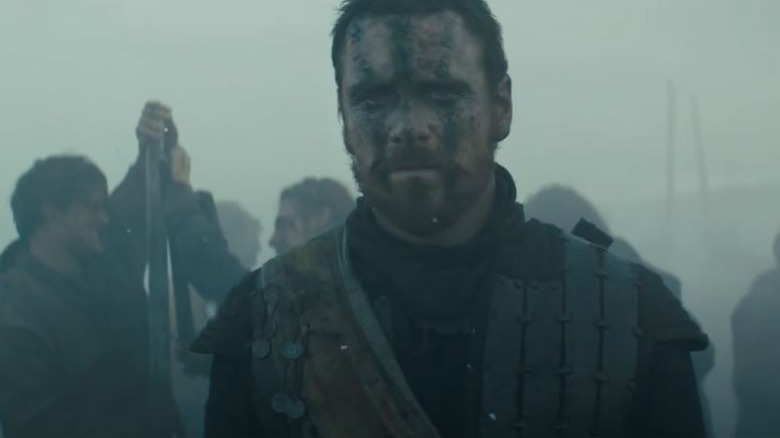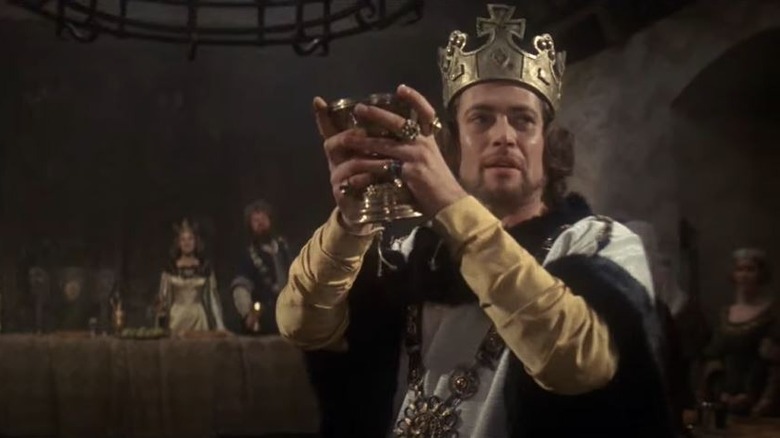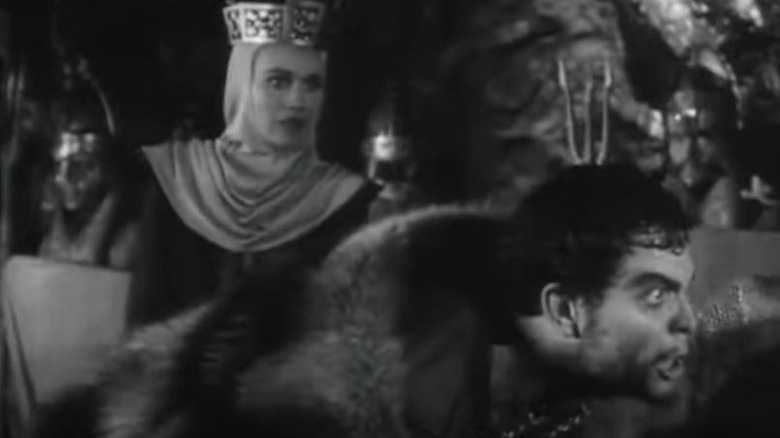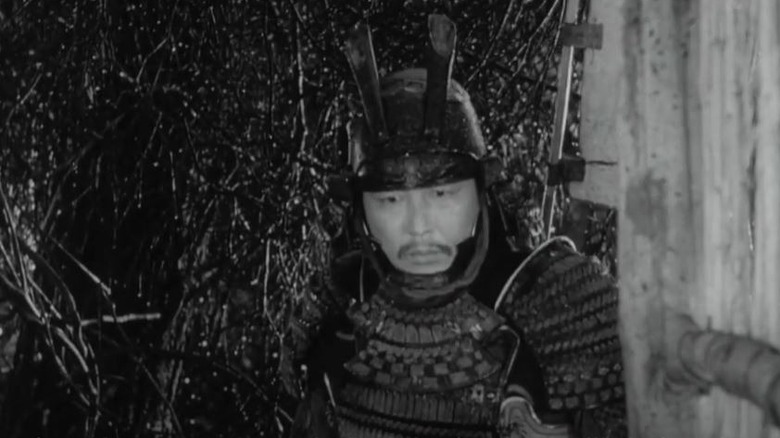Best Macbeth Onscreen Adaptations According To Rotten Tomatoes
William Shakespeare's "Macbeth" has been adapted to nearly every medium over the past few centuries. We've seen plays, ballets, operas — and, of course, movies. The adaptations have ranged from being entirely script-faithful to stories that only bear a passing resemblance, worlds away from Scotland. There are even at least two movies — 1995's "Joe MacBeth" and 1990's "Men of Respect" — that retell the story as a mobster rising through the ranks instead of royalty.
Despite all of these adaptations, only a few have enough reviews to qualify for a score on Rotten Tomatoes. This is due to numerous factors, including many of the early movies being lost to time and a lack of English language reviews for adaptations made outside the western hemisphere. Even so, there's at least a half dozen right now that clock somewhere on the Tomatometer. Here, we've listed those adaptations by score and provided a little bit of history for each of them. We're not focused on box office numbers — many of these flopped, in fact — just the production itself and the critical response.
6. Macbeth (2006)
2006 brought audiences an Australian take on "Macbeth," starring Sam Worthington in the title role. It takes the "Romeo + Juliet" approach to Shakespeare adaptations, taking place in the modern day ganglands of Melbourne while keeping most of the play's dialogue verbatim. It follows Macbeth rising through the ranks of a gang, and the movie is packed to the brim with violence and nudity.
It is also the only qualifying "Macbeth" adaptation to have a Tomatometer score below 50%. This one is a dud. Even those Fresh reviews come with an asterisk — most of them are just over the passing mark, be it 2 out 4, 3.5 out of 5, or a B-.
Many reviews acknowledge that the sex and violence are more prominent than the story itself, and most say that the overly slick set design makes it worse. Many critics said it feels more like a B-movie horror flick than any kind of respectable movie, much less a Shakespeare adaptation. The Los Angeles Times said the movie "has the over-stylized sheen of a car commercial." The Austin Chronicle said that "It's probably best not to look too deep for meaning," which is about the most scathing review an adaptation of Shakespeare's dramas can get.
Feel free to skip this one — there's not even much of a novelty factor.
5. Scotland, PA
"Scotland, PA" reimagines "Macbeth" with the smallest stakes possible given the story: a fast food joint in central Pennsylvania. The story follows Joe McBeth (James LeGros), who goes by "Mac," and his wife Pat (Maura Tierney). Mac works at Duncan's, owned and operated by Norm Duncan (James Rebhorn). The story is set in motion after Mac gets passed over for a promotion, and three hippies (the analogue for witches, two of whom are played by Andy Dick and Amy Smart) tell him that he has a future in management. Christopher Walken plays Lt. McDuff, a police inspector who ends up facing off against Mac, and veteran character actor Kevin Corrigan plays the movie's Banquo in Anthony "Banko" Banconi.
Even with such a solid cast and a unique premise, however, reviews are pretty middling — it has a Tomatometer score of 59%, just a shade on the Rotten side. Most reviews, positive or negative, acknowledge that it's basically a one-joke premise, and all acknowledge it as a pretty lightweight movie.
Roger Ebert summed it up best with his own review: "I enjoyed the movie in a superficial way, while never sure what its purpose was. I have the curious suspicion that it will be enjoyed most by someone who knows absolutely nothing about Shakespeare, and can see it simply as the story of some very strange people who seem to be reading from the same secret script."
4. Macbeth (2015)
2015's "Macbeth" is a straightforward adaptation of the source material. It stars Michael Fassbender as Macbeth and Marion Cotillard as Lady Macbeth. Sean Harris (best known to American audiences as Solomon Lane from the "Mission Impossible" movies) plays Macduff, and Elizabeth Debicki (best known for people asking "Wait, how tall is Elizabeth Debicki?") plays Lady Macduff. Rounding out the principal cast is David Thewlis as Duncan. Much of it was shot in and around Scotland, a surprising rarity for "Macbeth" movies.
This version of "Macbeth" is our first version that is Certified Fresh on the Tomatometer. Most reviews praise the cinematography and director Justin Kurzel's filmmaking prowess. Many praised Fassbender and Cotillard in particular, with the Toronto Star saying that "they make a magnetic pair." Cotillard in particular was singled out by many, with the Christian Science Monitor calling her performance "a triumph" and saying her "mad scene" was one of the "spookiest ... ever filmed."
3. Macbeth (1971)
Roman Polanski's 1971 adaptation of "Macbeth" is particularly infamous. Part of this is because it was the first movie he'd made after the Manson family murdered his wife, Sharon Tate. Part of it is that it was bankrolled by Playboy founder Hugh Hefner. Those two parts came together to produce a "Macbeth" that featured more nudity and violence than had ever been put in an adaptation of the play before. The actors playing Macbeth and Lady Macbeth — Jon Finch and Francesca Annis — were both under 30, relatively young for the part. The movie also explores themes of how history repeats itself, highlighted by a slightly altered ending which implies that a new cycle of violence will begin soon.
Polanski explained these choices to the New York Times by saying that "If you don't show violence the way it is, I think that's immoral and harmful." He also said he cast younger actors because Macbeth is "an ambitious, successful warrior — and warriors didn't live to be old men."
The film has a healthy score on Rotten Tomatoes, though there are too few reviews to make it Certified Fresh. Even so, the reviews paint a fairly uniform picture of a movie that took some big swings, with most critics appreciating them. Roger Ebert noted that it was impossible to not think of the Manson case, still stated that "It's as if the play has been inhabited by Hell's Angels who are quick studies. All of this, of course, makes Polanski's 'Macbeth' more interesting than if he had done your ordinary, respectable, awe-stricken tiptoe around Shakespeare."
2. Macbeth (1948)
Shakespeare, and "Macbeth" in particular, are an important part of Orson Welles' professional history. In the later 1930s, Welles worked with Negro Theatre Unit of the Federal Theatre Project to put on plays in Harlem — the most famous of which was the so-called "Voodoo Macbeth," which had an all-Black cast and took place on a Carribbean island where witches used voodoo instead of magic.
In 1948, Welles decided to do a slightly more conventional film adaptation of "Macbeth." He directed, starred, and wrote the screenplay for this version; it was also (as explained by the Chicago Tribune) a low-budget production, shot in 21 days with sets and costumes that had been repurposed from Republic westerns. These constraints show in the final project — many of the outfits look slightly out of place, and there's a definite sense that Welles wanted to do more. Everyone also speaks with a Scottish burr.
Jeanette Nolan played Lady Macbeth, Roddy McDowell played Malcolm, and Dan O'Herlihy — in his first-ever American production — played Macduff. Welles also added some religious overtones to the story, most notably with the new character of A Holy Father (played by Alan Napier).
The film has a healthy score on Rotten Tomatoes, though it's not Certified Fresh. Most of the reviews are relatively recent, either as retrospectives or in relation to a director's cut. Most praise Welles' performance and direction, noting how well he did on such a tight budget.
1. Throne of Blood
Legendary director Akira Kurosawa based three of his movies on Shakespeare. "The Bad Sleep Well" was loosely based on "Hamlet"; "Ran" is one of the highest regarded adaptations of "King Lear"; and "Throne of Blood" is considered the gold standard "Macbeth" adaptation. "Throne of Blood" is not a one-for-one adaptation of "Macbeth" — the ending is slightly different, as is the prophecy about how Macbeth can be beaten — but the core story and themes are functionally the same. It also integrates Japanese mythology and noh theater, with Kurosawa playing to his strengths.
"Throne of Blood" places the story in feudal Japan. The story's Macbeth is Washizu Taketoki (the incomparable Toshiro Mifune), a samurai warrior under Lord Tsuzuki of Spider's Web Castle. On his way back from battle, Washizu runs into an evil spirit who gives a specific prediction about the near future and foretells that he'll one day become Lord of Spider's Web Castle himself. When the first prediction comes true, he discusses it with his wife Asaji (Isuzu Yamada), a terrifyingly stoic woman — and she convinces him to kill Lord Tsuzuki himself.
"Throne of Blood" clocks in above 90 percent on Rotten Tomatoes, and is Certified Fresh. Every part of the movie receives praise, but special attention is awarded to the cinematography, the simple-yet-spooky atmosphere, and Mifune's performance. The Guardian says that "Throne of Blood" "remains a landmark of visual strength, permeated by a particularly Japanese sensibility, and is possibly the finest Shakespearean adaptation ever committed to the screen."
If you only ever watch one "Macbeth" adaptation, make it this one.
